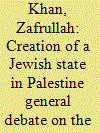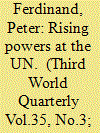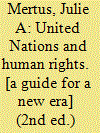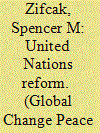| Srl | Item |
| 1 |
ID:
144960


|
|
|
|
|
| Summary/Abstract |
THE 70TH ANNIVERSARY of the United Nations Organization is an international event of signal importance. Set up as a fundamental element of the international system, the UN remains its cornerstone with no alternatives no matter what its numerous critics are saying in chorus. Today amid the disarray and contradictions of the contemporary world, mankind, if confronted with the task of setting up a universal international structure to preserve peace and security, would have come up with an indifferent result if not a failure. Critics concentrate at individual aspects of the UN activity and talk about details: they stand too close to be aware of the grandiose panorama of this construction, hence their attention to arches and façades
|
|
|
|
|
|
|
|
|
|
|
|
|
|
|
|
| 2 |
ID:
092184


|
|
|
|
|
| Publication |
2009.
|
| Summary/Abstract |
Sir Mohammad Zafrullah Khan (Pakistan) stated that despite the fact that the problem of Palestine had been studied by numerous commissions, a solution appeared to be no nearer than it had been during the previous thirty years.
|
|
|
|
|
|
|
|
|
|
|
|
|
|
|
|
| 3 |
ID:
131361


|
|
|
|
|
| Publication |
2014.
|
| Summary/Abstract |
This article examines the long-term trends of foreign policy convergence of Brazil, Russia, India, China and South Africa (BRICS) to determine the similarity of their positions on world issues, as they seek to 'insert' themselves more fully into global decision making. The analysis is based upon their votes in the UN General Assembly. The article compiles two indexes of voting for the period 1974-2011. Both demonstrate a high and now growing degree of cohesion among BRICS. Their voting is broken down by pairs to show common themes and the major issue divergences, and how often individual states voted with others. Nuclear disarmament and human rights are the two areas that reveal persisting divergences between these states.
|
|
|
|
|
|
|
|
|
|
|
|
|
|
|
|
| 4 |
ID:
091630


|
|
|
|
|
| Edition |
2nd ed.
|
| Publication |
London, Routledge, 2009.
|
| Description |
xxii, 202 p.Hardbound
|
| Series |
Routledge global institutions ; 33
|
| Contents |
Includes bibliographical references and index.
|
| Standard Number |
9780415491327
|
|
|
|
|
|
|
|
|
|
|
|
Copies: C:1/I:0,R:0,Q:0
Circulation
| Accession# | Call# | Current Location | Status | Policy | Location |
| 054537 | 341.48/MER 054537 | Main | On Shelf | General | |
|
|
|
|
| 5 |
ID:
074351


|
|
|
|
|
| Publication |
2006.
|
| Summary/Abstract |
When the United Nations (UN) Secretary-General, Kofi Annan, introduced his report 'In Larger Freedom' in March 2005, he set the organization on a path to pursue perhaps the most ambitious program for its reform since 1945. As part of that program, the Secretary-General proposed major changes to three key UN bodies: The Security Council, the General Assembly and the Commission for Human Rights. This article traces the progress of attempts to restructure these organs in the lead up to and following the World Leaders' Summit held at the UN in New York in September 2005. It is argued that, while some incremental institutional changes were effected at the Summit, the larger ends of the reform program were frustrated by the inability of the North and the South to agree on appropriate ways forward. This in turn reflected the radically different visions the contending parties had of the organization's nature and fundamental priorities.
|
|
|
|
|
|
|
|
|
|
|
|
|
|
|
|